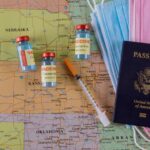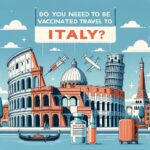Are you wondering, “Can I travel to Italy if I’m not vaccinated?” As the world continues to navigate the COVID-19 pandemic, travel restrictions and guidelines have become an essential aspect of international travel. In this article, we will explore the current travel restrictions and entry requirements for Italy, specifically addressing the question of whether unvaccinated individuals can travel to the country.
Italy, known for its rich history, vibrant culture, and stunning landscapes, is a popular destination for travelers. However, navigating the complexities of traveling during a global pandemic can be daunting, especially for those who are not vaccinated.
As we delve into the topic of travel to Italy as an unvaccinated individual, it’s crucial to understand the specific COVID-19 travel restrictions in place for the country. This includes detailing any entry requirements, potential quarantine protocols, and testing mandates aimed at curbing the spread of the virus. Additionally, we will discuss how vaccination requirements impact unvaccinated individuals seeking to visit Italy and explore alternative travel options that may be available.
Furthermore, we will examine how being unvaccinated may impact the overall travel experience in Italy – from potential limitations on activities and attractions to health and safety concerns that should be taken into consideration. Additionally, we will address legal and ethical considerations surrounding traveling unvaccinated and provide insights on how individuals can responsibly navigate this issue while protecting public health.
COVID-19 Travel Restrictions in Italy
Traveling to Italy as an unvaccinated individual raises a number of important considerations, particularly in light of the ongoing COVID-19 pandemic. As of the present, Italy has put in place specific travel restrictions and entry requirements for unvaccinated travelers, with the aim of managing the spread of the virus within its borders. It’s essential for individuals who are not vaccinated to be aware of these measures and how they might impact their travel plans.
In Italy, unvaccinated travelers are subject to certain entry requirements and restrictions that differ from those in place for vaccinated individuals. Upon arrival, unvaccinated travelers may be required to undergo testing for COVID-19, along with potential quarantine measures depending on their country of origin and current infection rates. These measures are designed to safeguard public health and reduce the risk of introducing new cases into the country.
For those considering travel to Italy without being vaccinated, it is crucial to stay informed about the latest regulations and guidelines set forth by Italian authorities. This includes regularly checking official sources for any updates or changes to entry requirements, testing protocols, and quarantine provisions. Additionally, unvaccinated individuals should be prepared for potential limitations on certain activities or attractions within Italy as part of efforts to mitigate virus transmission.
An often overlooked but highly important aspect of traveling while unvaccinated is understanding the potential health and safety risks involved. Unvaccinated travelers can be more susceptible to contracting and spreading COVID-19, which could pose a risk not just to their own health but also to others around them. It is therefore essential that unvaccinated individuals prioritize safety precautions such as wearing masks, practicing good hand hygiene, and maintaining physical distancing while in Italy.
| COVID-19 Travel Restrictions in Italy | Details |
|---|---|
| Entry Requirements | Unvaccinated travelers may be subject to testing and quarantine measures upon arrival |
| Health Risks | Unvaccinated individuals may face higher risk of contracting and spreading COVID-19 |
Vaccination Requirements
Italy has implemented specific travel restrictions and entry requirements for individuals wishing to visit the country, particularly in light of the COVID-19 pandemic. These regulations are crucial for safeguarding public health and mitigating the spread of the virus. Currently, Italy requires all travelers to provide proof of vaccination or a negative COVID-19 test result, regardless of their vaccination status. This means that unvaccinated individuals can still travel to Italy by fulfilling testing requirements.
For unvaccinated travelers, Italy currently mandates that they present a negative COVID-19 test result upon entry into the country. The accepted types of tests may include PCR or rapid antigen tests, which must be administered within a specific timeframe prior to arrival in Italy.
Additionally, unvaccinated travelers may be subject to quarantine protocols upon entry into Italy, depending on the evolving situation of the pandemic and public health guidelines. These measures are intended to minimize the risk of spreading the virus and protect both residents and visitors in Italy.
Furthermore, it is important for unvaccinated individuals planning to travel to Italy to stay informed about any updates or changes in vaccination requirements, travel restrictions, and entry protocols as these may evolve in response to ongoing developments related to COVID-19. Staying updated on relevant guidance from Italian health authorities and government agencies can help ensure a smooth and compliant travel experience for unvaccinated visitors.
| Topic | Data |
|---|---|
| Vaccination Requirements | Proof of vaccination or negative COVID-19 test required |
| Testing Requirements | Negative COVID-19 test required for unvaccinated travelers |
| Quarantine Protocols | Unvaccinated travelers may be subject to quarantine upon arrival |
| Guidance from Authorities | Stay informed about updates from Italian health authorities and government agencies regarding travel requirements. |
Alternative Travel Options
If you are not vaccinated and wondering if you can travel to Italy, there are alternative options available for unvaccinated individuals. While Italy does have specific travel restrictions and entry requirements in place for unvaccinated travelers, there are certain alternative measures that can be taken to facilitate travel to the country.
One alternative travel option for unvaccinated individuals is to adhere to quarantine policies upon arrival in Italy. Unvaccinated travelers may be required to undergo a mandatory quarantine period upon entering the country, typically ranging from 5-10 days depending on the specific region and prevailing health regulations. During this quarantine period, individuals are typically required to stay at a designated location and adhere to specific guidelines set forth by local health authorities.
Additionally, unvaccinated travelers may also have the option of fulfilling testing protocols in order to enter Italy. This may involve undergoing COVID-19 testing within a specified timeframe prior to departure and presenting negative test results upon arrival in Italy. Some regions may also require additional testing during or after the quarantine period as a means of monitoring potential exposure to the virus.
It’s important for unvaccinated individuals considering travel to Italy to closely monitor and stay informed about any updates or changes to these alternative travel options. Health guidelines and regulations can vary by region and may be subject to change based on evolving circumstances related to the COVID-19 pandemic. As such, it’s advisable for travelers to consult official government sources and seek guidance from reputable healthcare providers when planning their trip.
Impact on Travel Experience
Traveling to Italy as an unvaccinated individual can significantly impact your overall travel experience, particularly in terms of limitations on activities and attractions. Italy, known for its rich cultural heritage, offers a wide array of tourist attractions and experiences that may be impacted by the current COVID-19 travel restrictions and guidelines.
Visiting Cultural Sites and Attractions
Many of the popular cultural sites and attractions in Italy may have specific entry requirements for unvaccinated individuals, such as proof of a negative COVID-19 test or mandatory quarantine upon arrival. Additionally, some sites may have limited capacity or restricted access to unvaccinated visitors in order to adhere to social distancing and safety protocols.
Participation in Events and Activities
Participating in events, festivals, and other activities in Italy can also pose challenges for unvaccinated travelers. Certain events may have vaccination requirements for attendees, while others may implement additional health and safety measures that could impact the participation of unvaccinated individuals.
Dining and Entertainment Options
The dining and entertainment options available to unvaccinated travelers in Italy may also be limited due to certain restrictions or requirements imposed by restaurants, bars, theaters, and other establishments. In some cases, proof of vaccination or negative test results might be necessary to access these venues.
Health and Safety Concerns
Traveling to Italy can be an exciting and enriching experience, but it’s important for unvaccinated travelers to consider the potential health and safety concerns associated with their decision. The COVID-19 pandemic has prompted a range of measures and precautions to ensure public health, and it’s crucial for unvaccinated individuals to stay informed and take proactive steps to stay safe while traveling.
Understanding the Risks
Unvaccinated travelers should be aware of the potential risks associated with traveling to Italy during the ongoing pandemic. With the presence of new variants and fluctuating case numbers, there is a level of uncertainty when it comes to exposure to COVID-19. It’s important for unvaccinated individuals to understand that they may be at higher risk of contracting the virus compared to vaccinated travelers.
Protective Measures
To mitigate these risks, unvaccinated individuals should prioritize protective measures such as wearing masks in public spaces, practicing frequent hand hygiene, and maintaining physical distance from others. Additionally, considering less crowded times for visiting popular attractions and avoiding large gatherings can further reduce the risk of exposure.
Healthcare Access
Unvaccinated travelers should also familiarize themselves with healthcare resources and facilities in Italy. Understanding medical services available in their travel destinations can provide peace of mind in case of any health-related issues during their trip. It’s important for unvaccinated individuals to have access to medical care in the event that they experience COVID-19 symptoms or other health concerns while abroad.
By acknowledging these potential health and safety concerns and taking appropriate precautions, unvaccinated travelers can travel to Italy if they’re not vaccinated while prioritizing their well-being and that of others around them.
Legal and Ethical Considerations
Traveling to Italy without being vaccinated raises important legal and ethical considerations, particularly in the context of public health and safety. While individual choice and freedom are essential, it is crucial to also consider the responsibility to protect the health of others, especially in the midst of a global pandemic. Below, we delve into the legal and ethical aspects of traveling to Italy unvaccinated:
- Public Health Regulations: Italy, like many other countries, has implemented public health regulations aimed at controlling the spread of COVID-These regulations may include vaccination requirements for entry into the country or specific testing and quarantine protocols for unvaccinated individuals. It is essential to understand and adhere to these regulations when making travel plans.
- Ethical Considerations: When considering whether to travel to Italy unvaccinated, it is important to reflect on the potential impact on the local population. Unvaccinated individuals may pose a higher risk of transmitting the virus, especially to those who are more vulnerable. Ethical considerations include prioritizing the well-being of others and contributing to efforts to maintain public health.
- Legal Obligations: Travelers have a legal obligation to comply with the laws and regulations of their destination country. This includes adherence to vaccination requirements or other public health measures implemented by Italian authorities. Failure to comply with these legal obligations can result in travel delays, fines, or even deportation.
Furthermore, as travelers consider their options for visiting Italy unvaccinated, it is important to recognize that personal choices also carry broader societal implications. By prioritizing public health and safety in decision-making processes related to travel, individuals contribute to collective efforts aimed at overcoming the challenges posed by the ongoing pandemic.
Ultimately, navigating the legal and ethical considerations associated with unvaccinated travel requires a thoughtful approach that balances personal freedoms with societal responsibilities. As circumstances continue to evolve and new information emerges, staying informed about travel guidelines and engaging in responsible decision-making can contribute to promoting a safe and respectful travel experience for all individuals involved.
Conclusion
In conclusion, the decision to travel to Italy unvaccinated is a complex one that depends on a variety of factors including current travel restrictions, vaccination requirements, and individual health considerations. The COVID-19 pandemic has prompted countries like Italy to implement stringent measures to protect public health, and these measures may impact the ability of unvaccinated individuals to travel freely.
It’s important for travelers to stay informed about the latest guidelines and entry requirements for Italy, as they are subject to change based on the evolving situation.
Currently, unvaccinated individuals can face significant challenges when traveling to Italy, including potential quarantine periods and increased testing requirements. These restrictions can not only impact the overall travel experience but also raise ethical and legal considerations regarding public health responsibilities. Therefore, it is essential for unvaccinated travelers to carefully weigh the potential risks and limitations before making the decision to visit Italy.
As the global situation continues to evolve, there may be future changes in travel restrictions for unvaccinated individuals. It is advisable for travelers to stay updated on any developments and consider alternative options such as vaccination or adhering to specific protocols if they plan on visiting Italy. Ultimately, whether unvaccinated individuals can travel to Italy will depend on both external factors such as government regulations and personal choices that prioritize safety and public health.
Frequently Asked Questions
Are There Any Covid Restrictions in Italy?
As of now, Italy has implemented Covid restrictions to control the spread of the virus. These include mandatory mask-wearing in indoor public spaces and proof of vaccination or negative test for certain activities.
What Is Required for a US Citizen to Visit Italy?
For a US citizen to visit Italy, several requirements must be met. This includes providing proof of vaccination, a negative Covid test result, and completing a passenger locator form before arrival in Italy.
Can I Travel if I Don T Have COVID Vaccine?
It is still possible to travel without a Covid vaccine, but there may be additional requirements such as testing or quarantine upon arrival in certain countries. However, having the vaccine can make travel easier and reduce the risk of transmission.

I’m a passionate traveler, writer, and Italophile. My fascination with Italy’s history, art, and culture has led me on countless adventures across the Italian landscape. Through “I Live Italy,” I share my love for this extraordinary country and aims to inspire others to explore its boundless beauty.





